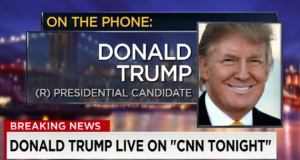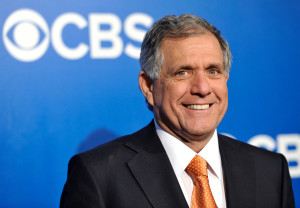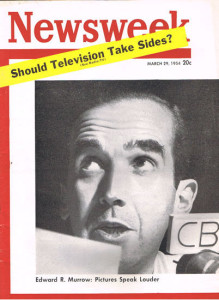“One of the basic troubles with radio and television news is that both instruments have grown up as an incompatible combination of show business, advertising and news. Each of the three is a rather bizarre and, at times, demanding profession. And when you get all three under one roof, the dust never settles.”
– Edward R. Murrow in 1958
——–
The front-runner for the Republican presidential nomination is many things – a narcissist, a psychopath, misogynist, authoritarian, Islamophobic, racist, but also the most accomplished manipulator of mass communication maybe in the history of American politics.

Donald Trump has completely figured out the relentless ebb and flow of modern political communication. He understands in detail the need to “feed the beast” and that the feedstock for television has little to do with substance. The modern news cycle is about always being available, responding immediately and constantly raising the bar of outrageousness. Trump’s unhinged personality and incessant need to be the center of attention is a perfect match for the tools of social media and 24-hour cable news.
Near as I can tell Trump never turns down an interview request unless it’s from Megyn Kelly on Fox, a level of accommodation for cable television’s conflict driven programming that has been irresistible as CNN’s president confirmed recently. Trump “has been much more available than many of the others who have been or are still in the race,” Jeff Zucker said. “Just because he says ‘yes’ and has subjected himself to those interviews, and [other candidates] don’t, I’m not going to penalize him for saying ‘yes.’”
Indeed. why penalize Trump when it is so lucrative to ratings and cash flow to constantly provide a forum? CNN has been charging 40 times it’s normal price for a commercial during the “Republican Debates Starring Donald J. Trump.” Co-dependency is obviously lucrative.
Trump has re-written the rules for the Sunday morning shows featuring what the great Calvin Trillin correctly terms “the Sabbath Gasbags.” Twenty-nine different times since the beginning of the campaign Trump has “phoned it in” to one of the Sunday programs and almost daily he does the same with television’s morning shows.
The telephone “interview” gives the small-fingered vulgarian a home field advantage. He tends to easily dominate these exchanges by filibustering and refusing to be interrupted. By conducting his media outreach by phone, Trump doesn’t have to put himself out by actually showing up in a studio and facing a questioner. As a result he rarely gets asked a follow up question, although he almost never provides a real answer in the first place. The “journalists” know, of course, that they are being played, but until recently everyone played along. Only when Trump’s tactics finally became the focus of print media coverage did Chuck Todd on NBC, for example, call a halt to the phone-a-phon.

Trump completely understands the weirdly perverse symbiotic relationship that links a no-nothing big-mouthed candidate with the venality that has come to characterize modern television news. The vicious and almost always vacuous cycle of personality and enabler goes something like this: TV needs ratings in order to sell commercial time. Outrage and spectacle drive ratings. Trump delivers outrage and spectacle. TV gives time to Trump. Ratings sore and cash registers ring. Voila!
“Man, who would have expected the ride we’re all having right now? … The money’s rolling in and this is fun.” That is a quote from CBS Chairman Les Moonves who spoke last month to a media conference in San Francisco. It was a rare moment of illuminating candor from the top guy at the network that was once home to Cronkite and Murrow. “I’ve never seen anything like this,” Moonves continued, “and this going to be a very good year for us. Sorry. It’s a terrible thing to say. But, bring it on, Donald. Keep going.”
“There is always a mutually beneficial relationship between candidates and news organizations during presidential years,” writes the New York Times media columnist Jim Rutenberg. “But in my lifetime it’s never seemed so singularly focused on a single candidacy. And the financial stakes have never been so intertwined with the journalistic and political stakes.” Just ask Les Moonves.
Vulgarity Meets the Broadcaster’s Bottom Line…
By one measure Trump has received nearly two billion dollars in free media coverage since his announcement of candidacy was, of course, carried live on cable television last summer. At one level the Trump phenomenon is easily explained: free advertising works. At least it works with 35-40 percent of the Republican electorate.
The “old media” – read “print” – scrutiny of Trump, by contrast, has been unrelenting and often excellent, with the New York Times and Washington Post producing detailed and often fascinating (as well as disturbing) accounts of the billionaire (is he really?) blowhard’s often unsuccessful business practices. The Post’s recent story on the lawyer Trump tried to conflict out of a lawsuit is both a great piece of reporting and one suspects a genuine glimpse into Trump’s sleazy approach to business and everything else.
Columnists like the Times’ Tim Egan and Frank Bruni have laid bare Trump’s complete disregard of facts and his fourth grade grasp of policy. Conservatives like David Brooks and Michael Gerson, a former George W. Bush speechwriter, have taken on Trump from the right with Gerson particularly challenging Trump enablers like Chris Christie and Ben Carson. Politico’s Roger Simon has a wonderful ability to burst the media bubble around El Trumpo and get to the essence of why he is so unprepared for the job and so dangerous in even seeking the job.
Even the sanctimonious George Will, a Sabbath Gasbag if ever there was one, has consistently hammered Trump, although Will’s groping for the principled high ground is increasingly hard to take since he has been among the chief conservative enablers to the “establishment” Republican Party that has done so much to create a genuine American demagogue.
Still every candidate for alderman knows that in politics you want to get your mug on tube. Trump rails against the “dishonest media,” but really could care less when a well-informed columnist calls him what he is. Trump is all about the airtime.
While media moguls like Moonves and Zucker count their millions it is worth remembering a simpler time when another powerful demagogue ranged across the land. Ed Murrow, the North Carolina-born broadcaster who came of age in the Pacific Northwest, was accused at the time of being late to the dissection of the demagogue from Wisconsin, Joseph R. McCarthy. Still, watching Murrow’s riveting thirty-minute takedown of “the junior senator from Wisconsin” in 1954 is a reminder of what television can do to puncture the bloated ego of a dangerous authoritarian.
When Murrow Took on McCarthy…

Murrow (and his producer Fred Friendly) used McCarthy’s own words to do him in during their famous See it Now broadcast. In his concluding essay Murrow, the Washington State University grad, reminded his generation that every citizen has a responsibility to speak out when evil lurks in the body politic.
Substitute “Trump” for “McCarthy” and you may experience an eerie sense of déjà vu when reading Murrow’s words from 1954.
“This is no time for men who oppose Senator McCarthy’s methods to keep silent, or for those who approve. We can deny our heritage and our history, but we cannot escape responsibility for the result. There is no way for a citizen of a republic to abdicate his responsibilities. As a nation we have come into our full inheritance at a tender age. We proclaim ourselves, as indeed we are, the defenders of freedom, wherever it continues to exist in the world, but we cannot defend freedom abroad by deserting it at home.
“The actions of the junior Senator from Wisconsin have caused alarm and dismay amongst our allies abroad, and given considerable comfort to our enemies. And whose fault is that? Not really his. He didn’t create this situation of fear; he merely exploited it — and rather successfully. Cassius was right. ‘The fault, dear Brutus, is not in our stars, but in ourselves.’ Good night, and good luck.”
McCarthy responded the following week, of course, by labeling Murrow a communist dupe. A few months late the Senate censured McCarthy and his influence rapidly cascaded into history.
In his engaging 1970 study of McCarthy and the United States Senate, which for too long abetted his undemocratic tactics, historian Robert Griffith used words that might have been written by a contemporary observer of our politics.

“To a considerable degree ‘Joe McCarthy’ was the creation of our communications system,” Griffith wrote in “The Politics of Fear,” his scholarly study of McCarthy, his methods and the Senate. “Like most instruments through which the past is mediated the press was an active and not a passive agent. They very questions asked determined the answers it reported. And these answers in turn shaped the total political context. Nor were these actions always conscious, consistent, or premeditated. The nation’s prestige press was overwhelmingly opposed to McCarthy, yet by the very intensity of its coverage it helped to assure his permanence as a symbol of Republican partisanship.”
Once upon a time executives at CBS, no doubt reluctantly and even frightened by what might happen, had the guts to allow Ed Murrow to unmask Joe McCarthy’s methods. The moment stands as one of the greatest in the history of a medium that has few enough great moments.
In his most famous speech to the Radio-Television News Directors Association in 1958, Murrow offered what is still a remarkably trenchant observation about television. “This instrument can teach, it can illuminate; yes, and even it can inspire. But it can do so only to the extent that humans are determined to use it to those ends. Otherwise, it’s nothing but wires and lights in a box. There is a great and perhaps decisive battle to be fought against ignorance, intolerance and indifference. This weapon of television could be useful.”
But does anyone in a position of authority at the big television conglomerates have the guts and the integrity to make it useful? The network run by the guy who says “Bring it on, Donald. Keep going,” doesn’t seem too likely to turn ’60 Minutes loose, even on a dangerous demagogue.









































